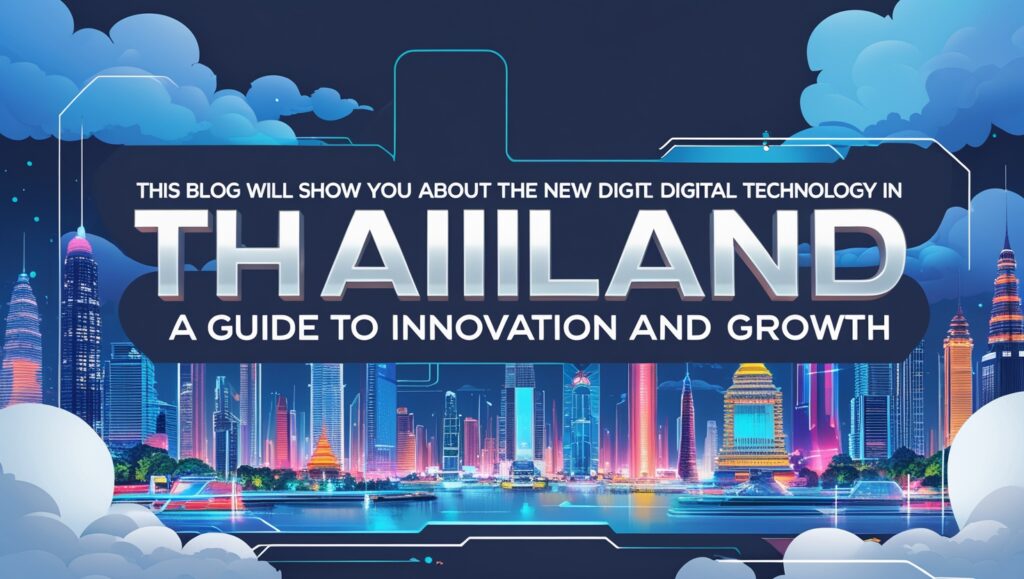This Blog Will Show You About the New Digital Technology in Thailand: A Guide to Innovation and Growth

The digital world is booming, and Thailand is no exception. This blog will show you about the new digital technology in Thailand, giving you a front-row seat to the innovations transforming everything from business to daily life. Whether you’re a tech enthusiast, an entrepreneur, or just someone curious about the tech scene in Southeast Asia, you’re in the right place. Let’s dive into this fascinating world of possibilities!
Thailand’s Digital Revolution: An Overview
Thailand has rapidly embraced digital technology, positioning itself as a Southeast Asian leader. The government’s Thailand 4.0 initiative aims to create a value-based economy driven by innovation and technology. The country’s tech landscape spans everything from e-commerce and fintech to artificial intelligence and smart cities.
This blog will show you about the new digital technology in Thailand: Key Factors Driving Digital Growth
Let’s break down the main drivers behind Thailand’s digital transformation:
Government Initiatives:
Programs like Thailand 4.0 are driving innovation. The initiative focuses on integrating advanced technologies like AI, IoT, and robotics into the agriculture, manufacturing, and healthcare sectors. For instance, the government has allocated over USD 4 billion to support smart city projects across key regions such as Bangkok and Phuket.
- Source: Ministry of Digital Economy and Society, Thailand
Rising Internet Penetration:
As of 2024, Thailand’s internet penetration rate has skyrocketed to 91%, making it one of the highest in Southeast Asia. With faster internet speeds and affordable data plans, even rural areas are getting connected. This rapid connectivity creates a robust digital audience hungry for new online experiences.
- Stat Reference: Digital 2024 Global Overview Report by We Are Social and Hootsuite
Entrepreneurial Spirit:
Thailand’s startup ecosystem is on fire! The number of tech startups has increased by 30% year over year, particularly in fintech, e-commerce, and health tech. Events like Techsauce Global Summit are fueling this entrepreneurial energy by connecting local talent with global investors.
- Example: Flash Express, a Thai logistics startup, became a unicorn (its valuation exceeded $1 billion) in just a few years.
- Source: Bangkok Post, Startups in Thailand
Foreign Investments:
Global tech giants are betting big on Thailand. Companies like Microsoft are investing $1 billion in cloud infrastructure to support the region’s growing digital economy, while Alibaba is setting up smart logistics hubs. These partnerships are not only creating jobs but also transferring cutting-edge tech knowledge to local businesses.
- Example: Alibaba’s $320 million investment in the Eastern Economic Corridor (EEC).
- Source: Reuters, Alibaba in Thailand
How Digital Technology is Shaping Thai Industries
1. E-Commerce: The Shopping Revolution
Thailand’s e-commerce sector is booming, with platforms like Shopee and Lazada dominating the market. The COVID-19 pandemic accelerated this trend, and now online shopping is second nature to many Thais.
- Why It’s Thriving: Convenient payment gateways, wide product availability, and a growing middle class.
- Fun Fact: Did you know Thailand ranks among the top countries for social commerce? People love shopping directly through Facebook and Instagram here!
2. Fintech: A Cashless Society
Thanks to digital technology, Thailand’s financial sector is undergoing a revolutionary transformation. Mobile banking apps like SCB Easy and PromptPay have made cashless transactions a part of everyday life, enabling seamless money transfers and purchases with just a few taps.
- What’s Hot?
- Peer-to-peer lending platforms empower individuals and small businesses by connecting them directly with lenders, bypassing traditional banking hurdles. Platforms like PeerPower lead the charge in offering competitive interest rates and faster loan approvals.
- Cryptocurrency adoption: Thailand is emerging as a crypto hub in Southeast Asia. With the Thai Securities and Exchange Commission regulating cryptocurrencies and fostering a secure trading environment, digital assets like Bitcoin and Ethereum are becoming more mainstream. Local exchanges such as Bitkub are seeing a surge in users.
- Contactless payments: Even the smallest street food stalls and local markets now accept QR code payments via apps like TrueMoney Wallet and Rabbit Line Pay. This democratization of digital payments is driving financial inclusion and making cashless transactions accessible to everyone, regardless of socioeconomic status.
- E-wallet innovation: Leading e-wallets incorporate rewards programs and loyalty schemes, encouraging more people to switch to digital payments. Features like cashback and discounts are making these apps indispensable.
With these advancements, Thailand is steadily moving toward becoming a fully cashless society, fostering financial inclusion and convenience across all demographics.
3. Smart Cities: Futuristic Living
Thailand is making giant strides toward building smart cities that redefine urban living. Phuket, Chiang Mai, and Bangkok are leading the way, where digital technology is being leveraged to enhance infrastructure, optimize transportation, and improve the overall quality of life for residents and visitors alike.
- Examples:
- Smart traffic systems: Traffic congestion is a major issue in urban Thailand, but smart traffic management systems are stepping in to ease the burden. These systems use AI-powered sensors and cameras to monitor real-time traffic flow, enabling dynamic traffic light adjustments and better route planning. Bangkok’s “Smart Traffic Center” is a prime example of how technology minimizes delays and reduces fuel consumption.
- IoT-enabled waste management: Phuket is implementing IoT solutions to efficiently manage waste collection and disposal. Smart bins with sensors notify waste management teams when they are full, ensuring timely collection and preventing overflow. This system not only keeps cities cleaner but also promotes sustainable waste practices.
- Energy-efficient smart grids: Chiang Mai’s smart grid initiatives are setting new standards for energy management. These grids integrate renewable energy sources like solar and wind power, distribute electricity based on real-time demand, and minimize energy waste. Residents can monitor their energy usage via apps, encouraging conservation and lowering costs.
- Public safety enhancements: AI-driven surveillance and smart lighting systems are being deployed in Bangkok’s busiest areas to improve safety. These systems can detect unusual activity and alert authorities instantly, creating a more secure environment.
- Digital public services: Many cities are rolling out e-governance platforms, allowing residents to access services like utility bill payments, permits, and public transportation schedules online. These innovations streamline interactions with government agencies and improve efficiency.
Thailand’s smart city initiatives reflect a forward-thinking approach to urban development, making life more convenient, sustainable, and connected for everyone.
4. Education: Learning in the Digital Age
With the rise of e-learning platforms like ClassStart and Learn Education, Thailand’s students have access to high-quality resources. Integrating digital technology into education has opened new doors for students and educators, creating opportunities for personalized and interactive learning experiences.
- Innovations:
- Virtual classrooms: Schools and universities are increasingly adopting platforms like Google Classroom and Zoom to facilitate remote learning. This was particularly vital during the pandemic and continues to be a flexible option.
- AI-driven personalized learning tools: AI-powered platforms analyze student performance to offer customized lessons and materials, ensuring no one is left behind.
- Gamified learning apps: Apps like Taamkru and Ling have made learning fun, especially for younger students, by turning lessons into engaging games.
- Hybrid learning models: Blending in-person and online education is becoming the norm, making education accessible to students in remote areas.
- Source: UNESCO Bangkok, Digital Learning Insights
5. Tourism: Enhancing the Visitor Experience
Tourism is a cornerstone of Thailand’s economy, and digital technology enhances the experience. From the moment you land to exploring the country’s iconic landmarks, technology ensures a smoother, more enriching journey.
- Examples:
- AR and VR tours: Imagine touring the Grand Palace or Ayutthaya ruins virtually before deciding to visit in person. AR and VR tools offer immersive previews.
- AI chatbots: AI-powered assistants on the TAT Contact Center provide real-time travel advice and recommendations.
- Smart ticketing systems: Attractions like Safari World and BTS Skytrain use smart ticketing solutions to make entry seamless and reduce wait times.
- Digital guide apps: Apps like Traveloka and Wongnai combine maps, reviews, and booking services to enhance travel planning.
- Source: Tourism Authority of Thailand, Digital Trends in Travel
Challenges in Thailand’s Digital Landscape where this blog will show you about the new digital technology in Thailand
Despite its advancements, Thailand faces challenges:
Digital Divide:
While urban areas like Bangkok are thriving with high-speed internet and smart city features, rural areas still struggle with limited access. For instance, less than 60% of rural households have reliable internet access. Bridging this gap will require significant investment in infrastructure and targeted government policies to ensure equitable growth.
- Example: Programs like Net Pracharat aim to connect remote villages, but progress has been slow.
Cybersecurity Issues:
A booming digital economy comes with an increased risk of cyberattacks. In 2023 alone, Thailand saw a 40% rise in phishing attacks and ransomware incidents targeting businesses and individuals. Companies often lack adequate cybersecurity measures, leaving them vulnerable. The government has introduced stricter data protection laws, such as the Personal Data Protection Act (PDPA), but awareness and implementation remain a challenge.
- Stat Reference: Cybersecurity statistics from Trend Micro 2023 Report
Skill Gaps:
The rapid pace of digital transformation has outstripped the supply of skilled professionals. Thailand needs an estimated 400,000 tech professionals in fields like AI, data analytics, and cybersecurity by 2025, but current training programs only meet about 60% of this demand. Universities and private companies are stepping up with specialized courses, but there’s still a long way to go.
- Example: Initiatives like the Digital Economy Promotion Agency’s (DEPA) coding boot camps are helping, but scalability remains an issue.
Why Thailand’s Tech Scene Matters Globally
Thailand’s tech advancements aren’t just local news. Here’s why they’re significant on the global stage:
Hub for ASEAN:
Thailand’s strategic location is a vital gateway to Southeast Asia’s rapidly growing market of over 600 million people. Its advanced logistics network and government initiatives like the Eastern Economic Corridor (EEC) position Thailand as a central hub for trade and technology. For instance, many multinational corporations are using Thailand as a base to reach neighboring countries like Vietnam, Cambodia, and Malaysia.
- Example: Thailand’s EEC integrates smart logistics and cutting-edge infrastructure to attract global players.
Startup Ecosystem:
Thailand’s vibrant startup scene is gaining international recognition. Accelerators and innovation hubs, such as True Digital Park and Space-F, are fostering homegrown talent and attracting foreign startups to collaborate. Thailand is also making waves by focusing on niche industries like health tech and agtech, addressing global challenges through innovation.
- Example: Eatlab, a Thai startup, is using AI to reduce food waste in restaurants, a concept that’s now gaining global acceptance.
- Source: Techsauce Global Startup Report
Sustainability Efforts:
Thailand’s commitment to sustainability through technology is noteworthy. From implementing AI in precision farming to developing renewable energy solutions, the country sets an example for green innovation. Solar farms and smart energy grids are now part of Thailand’s push to achieve its ambitious carbon neutrality goal by 2050.
- Example: The Lopburi solar farm, one of the largest in Southeast Asia, is powered by advanced IoT technologies.
- Source: ASEAN Renewable Energy Reports
These advancements highlight Thailand’s growing influence as a tech and innovation leader regionally and globally. By blending local ingenuity with global partnerships, Thailand is paving the way for a future where technology drives sustainable development and economic growth.
Personal Anecdote: Experiencing Thailand’s Tech Firsthand
I remember my first trip to Bangkok and marveling at how seamless everything was—from using a QR code to pay for street food to hopping on a ride-share scooter. It was a wake-up call to how much digital technology had become part of everyday life there. It’s not just about convenience; it’s about creating a better quality of life.
What’s Next for Thailand’s Digital Future?
Thailand’s digital journey is just getting started. Expect more innovation in:
AI and Machine Learning:
AI is set to revolutionize healthcare in Thailand, with predictive diagnostics and robotic surgery becoming more common. Logistics companies also leverage machine learning to optimize delivery routes and reduce costs. For example, startups are working on AI-driven warehouse automation systems that improve efficiency and minimize human error.
Blockchain:
While cryptocurrency is the most visible application, Thailand’s blockchain initiatives extend far beyond. Supply chain management systems using blockchain are helping businesses ensure transparency and combat counterfeit goods. Additionally, digital identity systems based on blockchain are making online transactions more secure and efficient. The government has started pilot programs to integrate blockchain into public services, such as land registration.
5G:
Thailand’s 5G rollout is one of the most ambitious in Southeast Asia. Expect faster, more reliable connectivity, enabling innovations like autonomous vehicles and smart manufacturing. Industries like entertainment and gaming are also set to benefit, with 5G providing low-latency environments for immersive experiences in AR and VR.
Green Tech:
Combining technology with sustainability is at the heart of Thailand’s future. Smart farming solutions use IoT devices to monitor crops and conserve water, while renewable energy startups integrate solar and wind power with advanced grid technologies. Thailand’s green initiatives aim to position it as a leader in eco-friendly tech solutions across the region.
FAQs: Everything You Wanted to Know and this blog will show you about the new digital technology in Thailand
1. What’s Thailand 4.0?
Thailand 4.0 is an ambitious government initiative designed to transform the country’s economy from a production-based one to an innovation-driven one. By integrating advanced technologies like artificial intelligence, robotics, and biotechnology, Thailand aims to increase productivity and improve the quality of life for its citizens. It also fosters industries like smart electronics, food innovation, and sustainable energy.
2. How is Thailand using digital technology in tourism?
Thailand’s tourism sector has embraced digital technology to offer seamless and enriched experiences. Virtual reality (VR) and augmented reality (AR) tours allow visitors to explore landmarks like Wat Pho and Ayutthaya from their smartphones. AI-powered chatbots assist tourists with travel planning, from booking hotels to suggesting local attractions. Additionally, smart ticketing systems, like the ones at Bangkok’s Grand Palace, ensure a hassle-free experience for visitors.
3. What are the challenges of digital technology in Thailand?
Despite its progress, Thailand faces some hurdles. The digital divide remains a pressing issue, with rural communities having limited access to high-speed internet. Cybersecurity risks are on the rise as the country’s digital economy expands. Furthermore, there’s a significant shortage of skilled tech professionals, which could slow down the pace of digital transformation if not addressed.
4. Why is Thailand’s tech industry important globally?
Thailand’s tech scene is vital not just regionally but globally. As the gateway to Southeast Asia, the country connects businesses to a market of over 650 million people. Its vibrant startup ecosystem, driven by initiatives like True Digital Park, attracts global investors. Thailand’s focus on sustainable tech solutions in agriculture and renewable energy positions it as a leader in addressing global challenges.
5. What can we expect in the future?
Thailand’s digital future is brimming with possibilities. Expect to see advancements in artificial intelligence (AI) driving innovations in healthcare and logistics. Blockchain technology will likely revolutionize industries beyond finance, such as supply chain management and digital identity verification. Expanding 5G networks will enable faster, more reliable internet connectivity. Sustainability-focused tech, like green energy solutions and precision agriculture, will also gain traction, reflecting the country’s commitment to a greener future.
Final Thoughts
This blog will show you about the new digital technology in Thailand and why it’s such an exciting time for the country. From e-commerce to smart cities, the possibilities are endless. Thailand is not just adapting to the digital wave; it’s riding it with full force. Whether you’re a traveler looking to experience a tech-savvy vacation, an investor eyeing opportunities in a growing market, or a digital nomad seeking innovation hubs, Thailand offers something for everyone. As the country continues to push boundaries, there’s no better time to dive in and explore the thriving tech ecosystem. Don’t just take our word for it—experience the digital transformation of Thailand yourself, and you might find it’s more than just impressive; it’s inspiring.


